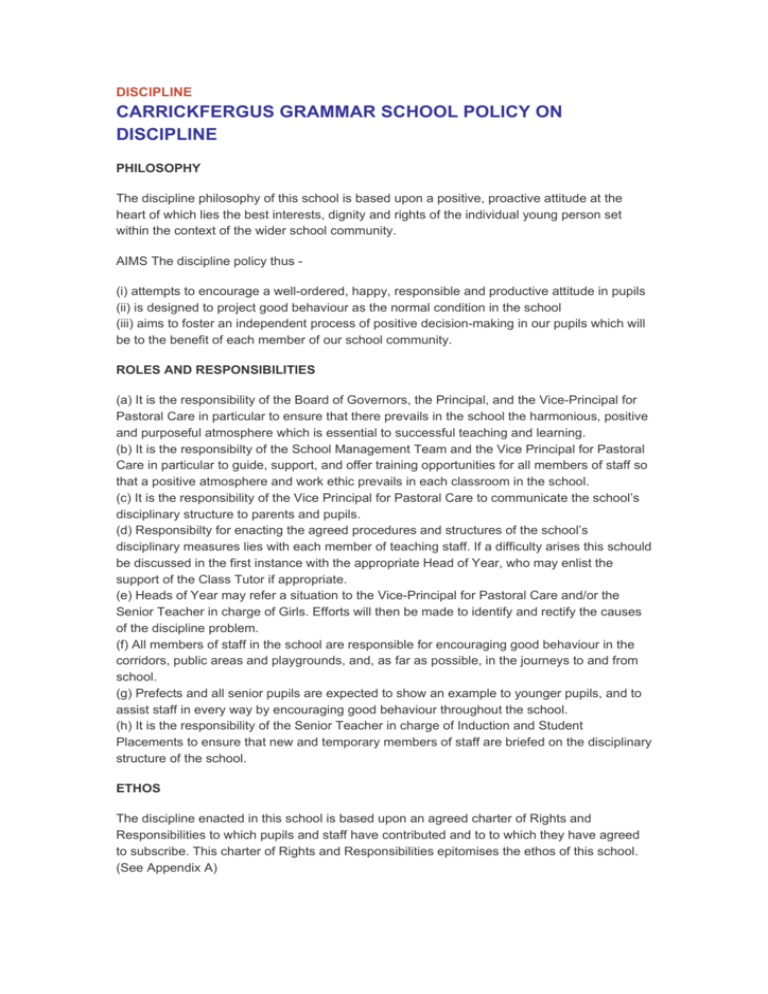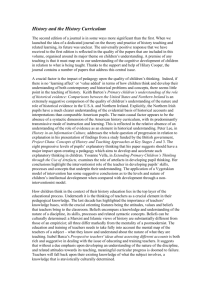CARRICKFERGUS GRAMMAR SCHOOL POLICY ON DISCIPLINE
advertisement

DISCIPLINE CARRICKFERGUS GRAMMAR SCHOOL POLICY ON DISCIPLINE PHILOSOPHY The discipline philosophy of this school is based upon a positive, proactive attitude at the heart of which lies the best interests, dignity and rights of the individual young person set within the context of the wider school community. AIMS The discipline policy thus (i) attempts to encourage a well-ordered, happy, responsible and productive attitude in pupils (ii) is designed to project good behaviour as the normal condition in the school (iii) aims to foster an independent process of positive decision-making in our pupils which will be to the benefit of each member of our school community. ROLES AND RESPONSIBILITIES (a) It is the responsibility of the Board of Governors, the Principal, and the Vice-Principal for Pastoral Care in particular to ensure that there prevails in the school the harmonious, positive and purposeful atmosphere which is essential to successful teaching and learning. (b) It is the responsibilty of the School Management Team and the Vice Principal for Pastoral Care in particular to guide, support, and offer training opportunities for all members of staff so that a positive atmosphere and work ethic prevails in each classroom in the school. (c) It is the responsibility of the Vice Principal for Pastoral Care to communicate the school’s disciplinary structure to parents and pupils. (d) Responsibilty for enacting the agreed procedures and structures of the school’s disciplinary measures lies with each member of teaching staff. If a difficulty arises this schould be discussed in the first instance with the appropriate Head of Year, who may enlist the support of the Class Tutor if appropriate. (e) Heads of Year may refer a situation to the Vice-Principal for Pastoral Care and/or the Senior Teacher in charge of Girls. Efforts will then be made to identify and rectify the causes of the discipline problem. (f) All members of staff in the school are responsible for encouraging good behaviour in the corridors, public areas and playgrounds, and, as far as possible, in the journeys to and from school. (g) Prefects and all senior pupils are expected to show an example to younger pupils, and to assist staff in every way by encouraging good behaviour throughout the school. (h) It is the responsibility of the Senior Teacher in charge of Induction and Student Placements to ensure that new and temporary members of staff are briefed on the disciplinary structure of the school. ETHOS The discipline enacted in this school is based upon an agreed charter of Rights and Responsibilities to which pupils and staff have contributed and to to which they have agreed to subscribe. This charter of Rights and Responsibilities epitomises the ethos of this school. (See Appendix A) STANDARDS OF BEHAVIOUR The standards of behaviour expected in this school derive from the charter of Rights and Responsibilititesd and are displayed around the school under the heading “Fair for One is Fair for All”. (See Appendix B). CLASSROOM RULESThe following rules apply in each classroom. Other additional rules may apply as appropriate in other areas of the school – e.g in classrooms where practical work takes place: 1 Come to class on time, and with everything you need for the lesson. 2 Enter the room quietly, and prepare for the lesson immediately. 3 Always cooperate respectfully with staff and pupils. 4 During the lesson… Do Raise you hand before speaking Make your best effort Listen attentively Ask relevant questions Follow instructions promptly Don’t Interrupt others Lose concentration Distract yourself, your teacher, or your classmates Stray from the topic Waste time 5 At the end of the lesson ensure that you have noted your homework, tidied your work area, and then leave the room quietly on your teacher’s instruction. DISCIPLINARY PROCEDURE Under the leadership of the Pastoral Care Team this school aims to enact structured, consistent disciplinary measures by the following four-step process. · A first minor misdemeanour will be given a warning. · A second will be punished by extra work. The teacher will also write a note in the Homework Diary for parents to read and sign. · A third minor misdemeanour or failure to complete the extra work and present parental signature in the Homework Diary will mean a Lunchtime Detention. The teacher will write a note informing parents of this in the Homework Diary. This will be given with at least 24 hours notice and should be read and signed by parents · If the issue is still not resolved a Formal Detention will be given. In this case a detention slip is sent home for parents to read and sign, again with at least 24 hours notice. We try hard to be as fair and supportive as possible, and whilst we aim to apply the above procedures consistently there is also room for flexibility depending on the nature of the offence. Rarely, serious or persistent incidents may result in Official Suspension from school. This means that we must inform our Board of Governors and NEELB of the matter. The ultimate sanction we may apply is Expulsion, although all efforts will be made to resolve matters before this final stage. EXPECTATIONS FROM PARENTS The school has a right to expect the co-operation of parents in all matters of discipline. We therefore ask – (a) that school Standards of Behaviour are adhered to and supported; (b) that actions taken by members of staff are supported as being in the best interest of the pupils; (c) that any problems which may arise be openly discussed with the Headmaster, Deputy Heads or Head of Year. Parents are invited to come to the school for consultation and discussion at any time. SUPPORT GIVEN From time to time the school may call upon the help of various support services which may have contact with parents. For example: (a) Education Welfare Officer (b) Educational Psychologist (c) CAMHS (Child and And Adolescent Mental Health Service) (d) The NEELB Counselling service Parents are encouraged to discuss such contacts with the school. CONCLUSION Discipline in the school situation involves the pupil, fellow pupils, staff and parents. It should have as its main aim, the positive academic, social and personal development of each pupil in the school community. Appendix A CARRICKFERGUS GRAMMAR SCHOOL Your Rights and Responsibilities within our School Community Academic Rights & Academic Responsibilities Top quality education Use ability to the full Teaching which motivates Show interest in learning Full range of facilities and resources Respect, share and use these Receive help and advice Ask for help and heed advice Learn without interruption Do not distract others Question and express opinion Listen and consider Vocational Rights & Vocational Responsibilities Best employment opportunities Commitment to personal goals Sound Careers advice Make informed choices Equal opportunities Respect differences Social Rights & Social Responsibilities Courteous and respectful treatment Show respect and courtesy Fair treatment by Teaching Staff Accept school rules & discipline A safe, secure environment Protect others, especially the young or weak Enjoy our years at school Approach school life sensibly Voice our opinions Consider other points of view Extra-Curricular opportunities Get fully involved in school life Personal Rights & Personal Responsibilities Acceptance as an individual & Accept others for who they are Express personal beliefs Consider others/work as a team Opportunity to learn from mistakes Act according to what is right Make our own choices & Accept responsibility for the choices we make Appendix B FAIR FOR ONE IS FAIR FOR ALL These are the standards we expect of you when you join our school. Please read them carefully. They apply to all pupils in the school. 1 We treat all members of our school community, staff and pupils, with the same courtesy and respect that we expect for ourselves. We care for those around us. 2 We know what our school uniform regulations are, and we wear our uniform with pride. We are tidy and well presented at all times. 3 We treat our environment with respect, and accept our responsibility for maintaining it to the highest standard. We use litter bins. 4 We give our best effort at all times. We meet deadlines and show genuine interest in using our talents to the full. 5 We are punctual to school and to lessons. We only use our lockers, mobile phones, personal stereos and vending machines before school, at break, at lunchtime, and after school. 6 We always act with proper regard for the health and safety of ourselves and others. 7 We follow instructions given by staff and prefects.





![afl_mat[1]](http://s2.studylib.net/store/data/005387843_1-8371eaaba182de7da429cb4369cd28fc-300x300.png)

